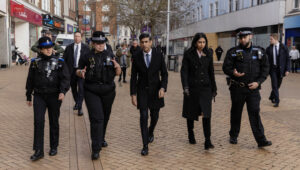It’s not every day that a close relative describes how they were once the subject of a $10,000 hit job. But this shady chapter of my family’s history came to light over the weekend during a long-distance telephone conversation about Thomas Cashman, who was yesterday handed a life sentence for the murder of nine-year-old Olivia Pratt-Korbel.
While my relative’s case involved an international business deal gone wrong, and bizarrely the middleman who brokered the hit became the gunman’s new target after his client reneged on a $2,000 payment, the reality of the average contract killing is very different. More often that not, it takes the form of a free-for-all in which innocent people die and morally repugnant paymasters get away with murder. As Olivia’s death in Dovecot, Liverpool, last August made clear, the world occupied by hitmen is underscored by nihilistic chaos.
Cashman, himself the 34-year-old father of two young children, had reportedly been offered £100,000 by his underworld bosses to kill Joseph Nee, a rival villain who Cashman’s associates claimed had stolen a sizeable drugs stash. During the botched hit, Nee, chased by Cashman, barged through the Korbels’ front door just as Olivia’s mother opened it to investigate the commotion outside. As Cashman continued to fire indiscriminately, a bullet hit Olivia in the chest. According to the front page of yesterday’s Sun, “gangland figures” have placed a £250,000 bounty on Cashman’s head — not as payback for murdering an innocent child, but to prevent him from revealing their identities in a feeble attempt to reduce his sentence.
Whether it’s an East End thing, a tabloid hack thing, or simply a morbid fascination with organised crime, I’ve never been too far away from the shadowy world of the contract killer. As a kid in the Seventies, when my family lived in New York, my mother worked for an Italian family who had a “connection” to those responsible for “whacking” mob boss Carmine “Cigar” Galante. More recently, I interviewed an ex-soldier who used to do some “work” for a notorious North London crime family before the nightmares became too much and he packed it all in. The activity of his bosses had been an obsession of the late crime writer and reformed gangster, John McVicar. John told me that he’d been warned by one of “the family’s” consiglieres to watch his back after their name kept cropping up in the column he wrote for Punch magazine. Not long after, said consigliere wound up getting whacked by a hitman on a motorcycle.
Such murders are, in criminal terms, at the Premier League-level of contract killings. Many of these hits go unsolved because the bike-riding masked assassins know what they’re doing, thanks to training, practice and experience. But such characters are few and far between. More often than not, lower-league criminals recruit hitmen from among the even lower-league “mandem” or assorted gangs that crop up all over poverty-stricken Britain. This recruiting ground has a constant supply of young, desperate, violent and, importantly, cheap contract killers.
Today, they are only getting younger and more desperate. Right now, a 15-year-old named Santre Gayle, jailed in 2011, is believed to be Britain’s youngest contract killer. He’s certainly the youngest that we know of. But several organised crime sources have told me — all with the same sick, macabre pride — that they have groomed 12, 13 and 14-year-olds to do their dirty work for next-to-nothing. When I mentioned to one that Gayle was paid a measly £200 to shoot dead a woman on her doorstep, apparently as a revenge attack sanctioned by an ex-partner with connections to London’s Turkish underworld, he joked that he “got over the odds”.
While politicians and the media fulminate over Muslim grooming gangs because it is an obvious, reactionary vote-winner, far less attention is paid to the other more organised, and often culturally removed, criminal subgroups involved in grooming young black boys as junior hitmen. Much of what passes, dismissively, as internecine street gang warfare in London, Birmingham and Manchester belies a grimy underworld in which black boys and white working-class boys are spotted, recruited, groomed and then exploited — not just as tools in the more commonly reported phenomenon of “county lines” drug dealing, but as urban boy soldiers.
It is, after all, a tried and tested method. As Issa Sesay, the jailed leader of Sierra Leone’s Revolutionary United Front (RUF), once told me, the modus operandi of the RUF had been to recruit boy soldiers barely into puberty because they were desperate, impressionable, and, crucially, loyal. It is this modus operandi that now plays a key role in the new breed of amateur hitman — kids who one minute are playing Call of Duty, and the next are looking at a life sentence for killing someone for £200. They are often forced into it by “olders” who bully, intimidate and even strong-arm family members into supporting them. Most vulnerable are single mothers, who can be easily targeted if their son doesn’t step up and do his master’s bidding.
And increasingly, this bidding is no longer confined to the criminal world. In this secular, morally relative world, it’s not just drug dealers and racketeers who “need someone taken care of” when things go sideways. The news is now filled with tawdry tales of foolishly desperate people — a property developer in debt; an obsessive work colleague; rumours of a jilted family member — who resort to backstreet hitmen to settle their scores. It’s a telling metaphor of modern Britain, where the dark side of social mobility dictates that shifty middle-class types, like traditional gangsters before them, now think they can buy their way out of trouble by getting someone else to do their dirty work.
Perhaps the most revealing example of this took place in 2002, when property investor Nicholas van Hoogstraten was jailed for manslaughter after paying some muscle to rough up a business associate, Mohammed Raja. While the courts accepted that “there is no evidence that he had intended Mr Raja to be murdered”, Raja was stabbed five times and shot in the head by two hitmen. That is the trouble with hired killers: as they are generally psychopathic, there is no legislating for what they might do on the job. This key detail is a point that even Boris Johnson overlooked when, in the Nineties, the Daily Telegraph’s then Brussels correspondent reportedly conspired with an old Etonian buddy to have News of the World reporter Stuart Collier roughed up.
All too often, bourgeois types who enter into the murky world of contract killing swiftly find themselves in hot water. Patently, anyone who is prepared to kill someone for money is not only criminally minded, but criminally naïve. After all, professional hitmen don’t think twice about turning the gun on their client if they don’t pay up, or if bumping them off removes one key point in the evidential trail.
That’s probably why the wealthier gangs in Britain tend to outsource their dirty work. When I interviewed former North London gang leader Bobby Cummines for Channel 4’s Secrets of Police Marksman, he told me that one of the most fool-proof methods for contracting a hit involves setting up a reciprocal arrangement with foreign gangsters. If, for argument’s sake, your “firm” had a long-standing arrangement with a gang in The Netherlands and you wanted someone taken care of in the Midlands, you would fly one of their team over (all expenses paid) and supply them with necessaries, including firearms. They would then do the job and fly home the following day, making the hitman virtually untraceable.
But such cases make up a small minority. Far more common is the disordered, anarchic style of hit carried out by Cashman, whose gun initially jammed before he killed an innocent nine-year-old. In this way, Olivia’s death was of course a tragedy. But it was also an expression of nationwide nihilism: of the disregard some criminals have for innocent life, of the atomising chaos that inevitably follows, and of an anaesthetised society and political class that witnesses such violence before quickly turning the page.
Disclaimer
Some of the posts we share are controversial and we do not necessarily agree with them in the whole extend. Sometimes we agree with the content or part of it but we do not agree with the narration or language. Nevertheless we find them somehow interesting, valuable and/or informative or we share them, because we strongly believe in freedom of speech, free press and journalism. We strongly encourage you to have a critical approach to all the content, do your own research and analysis to build your own opinion.
We would be glad to have your feedback.
Source: UnHerd Read the original article here: https://unherd.com/




